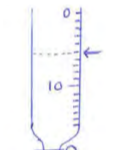KNEC KCSE Physics Paper 1 Question Paper / 2015 KCSE Kericho West Joint Examination
2015 KCSE Kericho West Joint Examination
Physics Paper 1
SECTION A : (25 Marks)
Answer all questions
Figure 1 shows a burette containing some liquid after 8g of the liquid was drained out. If the level of the liquid was initially at 10cm3 mark, determine the density of the liquid.
2 marks
State one advantage of alcohol thermometer over mercury thermometer.
1 marks
In an experiment to demonstrate Brownian motion, smoke was placed in an air cell and observed under a microscope. State and explain the nature of the observed motion of the smoke particles.
2 marks
The figure 2 below shows a uniform rule AB of length 1.0m and weight 1.2N. The system is in equilibrium.
Fig 2
Determine the weight of X.
3 marks
The figure 3 below shows a solid cone standing on a horizontal surface. The cone is in unstable equilibrium.
Fig 3
On the horizontal space provided, sketch the cone in neutral equilibrium.
1 marks
The sketches in figure 4 shows the variation of extension with force for springs A and B.
Given that the spring A and B are of equal lengths, state any two factors that can be used to explain the difference in the graphs.
2 marks
The figure 4 below shows water drops on two surfaces. In (a) the glass surface is smeared with wax while in (b) the glass surface is clean.
Explain the difference in shapes of the drops.
2 marks
An external force applied to a ball of mass 160g increases its velocity from 25cm/s to 275cm/s in 10 seconds. Calculate the force applied.
3 marks
The figure 5 below shows a model of a spray gun. When air is blown in the direction shown, a spray is observed. Explain this observation.
3 marks
A wooden bench and a metal bench are both left in the sun for a long time. Explain why the metal bench feels hotter to touch.
3 marks
The figure 6 below shows a metal sphere of mass 2kg moving along a smooth horizontal surface PQ, with a steady speed of
4ms-1
.
Fig 6
a) Explain why the speed of the sphere decreases as it moves up along QR. (1 mark)
b) If the sphere reaches R with a speed of 1.0ms-1
, calculate the change in its K.E from Q to R. (2 marks)
3 marks
A column of glycerine 8.20m high, a column of sea water 10.08m high, column of mercury 0.76m high and a column of fresh water 10.34m high exert the same pressure at the bottom of the container. Given that the pressure exerted by a fluid is given by P = h g, arrange these liquid in decreasing order of their densities. (2 marks)
3 marks
SECTION B : (55 Marks)
Answer all questions.
a) State two factors on which the linear speed of a body moving in a circular motion depends on. (2 marks)
b) Explain why bodies is circular motion undergo acceleration even when their speed is constant. (1 mark)
c) A motorcycle is travelling at a constant speed of 72kmh-1 around a circular track of radius 150m.
i) Determine its centripetal acceleration. (2 marks)
ii) How long does the cyclist take to complete one full cycle of the track? (2 marks)
d) A person of mass 50kg is on a swing which has a speed of 10ms-1 at the lowest point of its motion. The ropes of the swing
are 2.5m long, Find the tension of the ropes. (Take g = 10ms-2) (3 marks)
10 marks
a) Explain why objects float higher in salty water than in fresh water. (2
marks)
b) In an experiment to determine the density of a liquid, a uniform metal cylinder of cross-sectional area 6.2cm2 and length 4.5cm was hang from a spring balance and lowered gradually into the liquid. The upthrust was determined for various submerged lengths. The results obtained are shown on the graph in the figure.
Using the graph, determine:
i) the value of the upthrust when the cylinder is fully submerged. (2 marks)
ii) the density of the liquid. (2 marks)
c) The mass of the fabric of a large balloon is 100kg. The balloon is inflated with 200cm3 of helium. The balloon is attached to a cable fixed to the ground as shown. (Density of air and helium are 1.25kg/m3 and 0.2kg/m3 respectively)
i) Indicate all the forces acting on the system. (1 mark)
ii) If the system is at equilibrium, write an equation relating the three forces in (i) above. (2 marks)
iii) Calculate the upthrust on the balloon. (3 marks)
12 marks
a) A ball is thrown vertically upwards from the ground. It rises up to the highest point and then returns to the ground.Taking the upward velocity to be positive, sketch the velocity -time graph for the motion. (3 marks)
b) A bullet is fired from a gun at a velocity of 10m/s. It strikes the tree, perpendicularly and penetrates deeply. If it stops just as it emerges through the other side of the tree,
i) Calculate the average retardation if the tree is 2m thick. (3 marks)
ii) Time taken by the bullet in the tree. (3 marks)
c) The figure (a) below shows a distance -time graph of a motion of a body.
In the figure (b), sketch the corresponding velocity-time graph for the same motion. (1 mark)
10 marks
a) Define the term specific heat capacity of a substance. (1 mark)
b) An immersion heater rated at 180W is placed in a liquid of mass 2kg. When the heater is switched on for 7.5 minutes and
the temperature of the liquid rises by 40°C. Determine the specific heat capacity of the liquid. (3 marks)
c) The graph below shows how temperature of a 40kg of a substance varied with time as it was heated steadily by electrical means. The heating coil carried a current of 16A at a potential difference of 22V.
i) What is happening to the substance at AB? (1 mark)
ii) Determine the specific heat capacity of the substance in solid state. (2 marks)
iii) Determine the latent heat of fusion of the substance . (2 marks)
d) Give a reason why the hand feels cold if a little ether is poured on it. (1 mark)
e) A 200g mass of copper was heated to 100°C and then transferred to a lagged copper calorimeter of mass 5g containing 125g of water at 30°C. Calculate the final temperature of water. (Specific heat capacity of copper = 400J/KgK, water = 4200J/KgK) (3 marks)
14 marks
a) The figure below shows a pulley system being used to raise a load.
Given that the size of the load is 500N and the effort applied is 200N, calculate the efficiency of the machine.(3 marks)
b) A pendulum bob is raised to a height of 60cm above its lowest point and made to swing as shown in the figure.
Determine the velocity of the mass at the height where kinetic energy is equal to the potential energy. (3 marks)
e) Jacky whose mass is 75kg runs up a flight of stairs each 12cm high in 12 seconds. Given that the acceleration due to gravity is 10ms-2, calculate the power he develops. (2 marks)
d) Explain why a body moving in horizontal circular motion does not work. (2 marks)
10 marks






